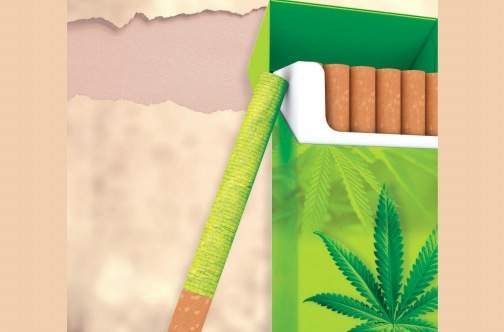Do not be surprised if legal cigarettes made from ganja (cannabis) hit the streets soon.
Major producers like Carreras are probing that and other cannabis possibilities, as increasing competition from illegally imported cigarettes continues to burn deeper into the profits of the legal trade.

It is no secret that British American Tobacco (BAT), the parent company of Carrerras, has, like other major US tobacco dealers including Phillip Morris, been looking at the cannabis market and the possibility of producing mild cigarettes restricted by the legal content of the main cannabinoids — cannabidiol (CBD) and tetrahydrocannabinol (THC), although only THC is psychoactive.
Carreras Limited’s Managing Director Marcus Steele has said that, like parent company BAT, Carreras is prepared to compete in a legal cannabis environment.
“As long as it is legal, we are in the combustible business. It happens to be cigarettes, but if tomorrow morning it is cannabis, it is another product in the combustible side of the business. I am sure we would be more than interested,” Steele said at last Thursday’s sitting of the Jamaica Observer Press Club.
He said that anyone who has been tracking developments at BAT, which owns Carreras and several other tobacco companies in Latin America and the Caribbean, would understand how it has been approaching the issue of smoking cannabis.
“Where the opportunity resides, we are not sitting on the fence. We talk it, we monitor it, and we are preparing ourselves, and Jamaica is no different. I will leave it at that,” he stated.
When the Observer asked Agriculture and Fisheries Minister Audley Shaw how he felt about local production of cannabis cigarettes for the Jamaican market, he said that the possibilities of the recreational use of cannabis as cigarettes is something that the Government is monitoring as a possible boost to the economy.
“As time goes by, I think we will be able to embrace recreational cannabis as part of the (tourism) industry,” Shaw told the Sunday Observer.
Shaw, the former minister of finance and the public service, has strongly advocated the use of cannabis for medicinal purposes, but believes that at some stage legality should be extended to its recreational use in the tourism industry.
After being in close touch with Carreras and other members of the local cigarette business, Shaw had been facing mounting complaints from the local distributors about the fact that illegally imported brands now account for almost 50 per cent of the market.
Steele had complained Thursday that high excise duties and illegal operations at the local ports, which is allowing loads of containers filled with imported cigarettes into the market without paying duties, are stifling the legal distributors.
Shaw, during his tenure as finance minister, became familiar with the situation, as well as Steele’s complaint that the Government is losing millions of dollars in revenue from the illegal importation.
With the growth of the cannabis industry in the United States, BAT has also been looking at the industry.
Shaw said Thursday that, as far as the Government is concerned, currently its only interest is in the availability of medicinal cannabis products. However, he said that the Government is aware of the possibilities of recreational cannabis products.
He said that his observations during recent trips to Canada, to explore their legal use of cannabis, are that the recreational cannabis industry there is twice as big as the medicinal market.
In the United States as well, in a growing number of federal states including California and Florida, voters have been showing empathy with campaigns aimed at removing most of the laws which have restricted use of the drug.
The same has been happening in Europe where, for example, Switzerland recently allowed the sale of cannabis cigarettes with low CBD and THC value in supermarkets.











